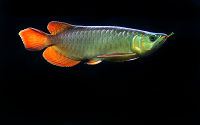Difference between revisions of "Scleropages formosus"
From The Aquarium Wiki
m |
|||
| Line 36: | Line 36: | ||
|max_water_hardness=18 | |max_water_hardness=18 | ||
}} | }} | ||
| − | + | ||
| − | + | == Sexing == | |
| − | + | :Difficult to sex, mature females tend to be plumper than males. Are bred in captivity but only in very large ponds and in controlled conditions. | |
| − | + | ||
| − | + | ||
| − | + | == Tank compatibility == | |
| − | + | :Do not keep with smaller fish as they will be mistaken as prey. Keep with larger fish such as [[Tinfoil Barb]]s, [[Giant Gourami]], and large Catfish. | |
| − | + | ||
| + | |||
| + | == Diet == | ||
| + | :Must be fed a carnivorous diet of shrimp, fish fillets, mussels, cockles and live insects such as crickets. Should '''not''' be fed [[Feeder Fish]] such as [[Goldfish]]. | ||
| + | |||
| + | |||
| + | == Feeding regime == | ||
| + | :Feed once a day. These fish are prone to [[Drop Eye]] in captivity, so feed them carefully. | ||
| + | |||
| + | |||
| + | == Environment specifics == | ||
| + | :A laterally long tank is a must for this fish, width is more important than depth, the Arowana must have room to turn around as it's not very flexible! A secure lid is a must as the Arowana is purely top-dwelling and can jump. | ||
| + | |||
| + | |||
| + | == Behaviour == | ||
| + | :Most are entirely carnivorous, often being specialized surface feeders. They are excellent jumpers and it has been reported that Arowana species have been seen leaping more than 6 feet (almost 2 metres) from the water surface to pick off insects from overhanging branches in South America, hence the nickname "Water monkeys". Arowanas have been rumoured to capture prey as large as low flying bats and small birds. All species are large, and the [[Arapaima]] is a contender for the world's largest freshwater fish. | ||
| + | |||
| + | |||
| + | == Identification == | ||
| + | :Similar in shape to the more well known [[Silver Arowana]] but the body is a little stockier with larger scales and shorter fins and [[barbels]]. The caudal peduncle is very thin when compared with the rest of the body and the caudal fin is fan-shaped. The back is olive while the flanks are greenish grey to olive-silver. A greenish iridescence may be present. The fins are greenish brown and the iris of the eye is red. | ||
:There are several colour variations of this Arowana now available, including Golden and Super Red. | :There are several colour variations of this Arowana now available, including Golden and Super Red. | ||
| − | + | ||
| + | |||
{{Categories | {{Categories | ||
|Category=Fish, Fish (Freshwater), Oddballs, Arowanas | |Category=Fish, Fish (Freshwater), Oddballs, Arowanas | ||
Latest revision as of 02:24, 13 December 2017
Asian Arowana
Scleropages formosus
946 Litres (250 US G.)
50-90 cm (19.7-35.4")
Freshwater
6.5 - 7.5
24 -30 °C (75.2-86°F)
8-18 °d
1:1 M:F
8-18 years
Family
Osteoglossidae
This animal is available captive bred
Contents
Additional names
- Asian Arowana, Green Arowana, Asian Bonytongue, Dragonfish
Additional scientific names
- Osteoglossum formosum
Sexing[edit]
- Difficult to sex, mature females tend to be plumper than males. Are bred in captivity but only in very large ponds and in controlled conditions.
Tank compatibility[edit]
- Do not keep with smaller fish as they will be mistaken as prey. Keep with larger fish such as Tinfoil Barbs, Giant Gourami, and large Catfish.
Diet[edit]
- Must be fed a carnivorous diet of shrimp, fish fillets, mussels, cockles and live insects such as crickets. Should not be fed Feeder Fish such as Goldfish.
Feeding regime[edit]
- Feed once a day. These fish are prone to Drop Eye in captivity, so feed them carefully.
Environment specifics[edit]
- A laterally long tank is a must for this fish, width is more important than depth, the Arowana must have room to turn around as it's not very flexible! A secure lid is a must as the Arowana is purely top-dwelling and can jump.
Behaviour[edit]
- Most are entirely carnivorous, often being specialized surface feeders. They are excellent jumpers and it has been reported that Arowana species have been seen leaping more than 6 feet (almost 2 metres) from the water surface to pick off insects from overhanging branches in South America, hence the nickname "Water monkeys". Arowanas have been rumoured to capture prey as large as low flying bats and small birds. All species are large, and the Arapaima is a contender for the world's largest freshwater fish.
Identification[edit]
- Similar in shape to the more well known Silver Arowana but the body is a little stockier with larger scales and shorter fins and barbels. The caudal peduncle is very thin when compared with the rest of the body and the caudal fin is fan-shaped. The back is olive while the flanks are greenish grey to olive-silver. A greenish iridescence may be present. The fins are greenish brown and the iris of the eye is red.
- There are several colour variations of this Arowana now available, including Golden and Super Red.
Pictures[edit]
Videos[edit]
External links[edit]
- Fishbase (Mirrors:
 )
)
- Mongabay
- Aqua Articles Breeding Asian Arowana


